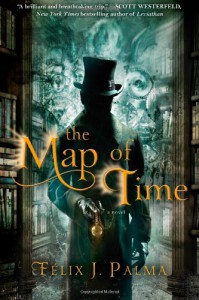
The Map of Time, by Felix J. Palma

I loved this, but I recognise it's a hard sell. It's also hard work to read, it took me quite a long time (a couple of months actually) to work through it, and a couple of times, as much as I loved it, I was a little loathe to pick it back up just because I knew I'd have to be using my brain to keep up. It was a lot of fun though in the end.
Although it's a modern book, it is a) translated into English, and b) written in a victorian style emulating a Wellsian style that frequently straddles the line into purple prose. Which is the reason it's hard work and a hard sell, because I love that kind of thing when done well and I consider this done well, but I know a lot of people don't.
The book itself consists of three tightly interconnected novella length sections, each telling a different story, and each with H.G. Wells himself as a central character. Wells is endlessly fascinating to me: he was a socialist, anti-eugenicist, early darwinist. He was anti-racist, anti-apartheid, and pro-feminist. Orwell wrote of him that he was "too sane to understand this modern world", and this book does a lovely job of presenting it's fictionalised version of him as a thoroughly interesting man. In fact, as a biography, it's better than a lot of actual biographies, despite the liberties it takes. And I suspect the translation is impressive, although it's a little hard to say for sure since I can't read the original - and the original, written in Spanish, is an emulation of Wells as translated into Spanish. Which is just as recursive as the actual plot of the book.
I'm not going to summarise it, because it's very tightly plotted and any summary would be quite spoilerific. It's also a meandering wander through everything Victorian, from Merrick to Jack the Ripper, African exploration and English class structures, from Henry James to Bram Stoker (who both turn up as characters), from hoax time travel to the real thing (perhaps), complete with alternate parallel universes, causality paradoxes and in the central novella, one of the dodgiest romance plots ever written, which still somehow had me rooting for the participants.
As mentioned the plot is recursive, characters that appeared briefly in part one show up again later (or do they?), discoveries the characters make of absolute truth or not truth are turned on their heads. And it's delightfully self-aware and a bit existentialist, in some ways. For instance Wells berating another character for the florid purple writing style of a manuscript, but doing so in ... well florid and purple prose. And Wells musing on how ironic it would be to be the character in future book written with himself as a character.
Also: This would make a fantastic movie. Or graphic novel. I suspect the writing style makes the plot, which is fantastic but takes a little while to get to, hard to fathom for a lot of readers.
 10
10
 6
6











